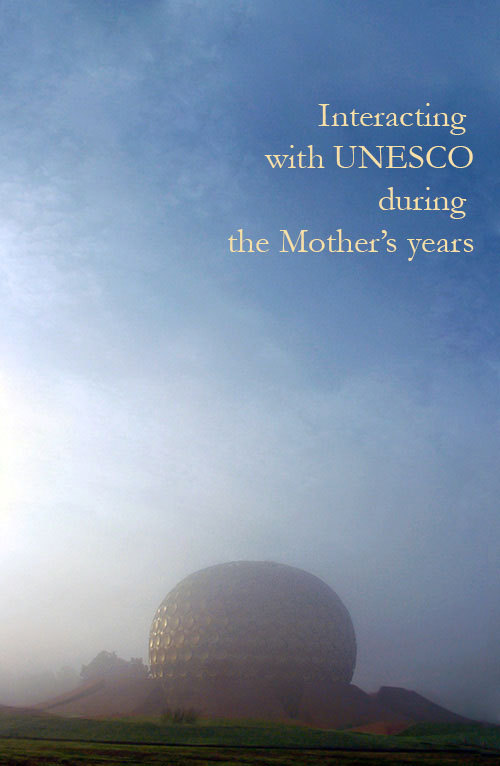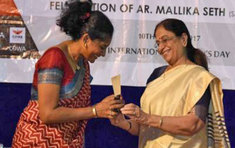Last updated:
Statements of Support - UNESCO
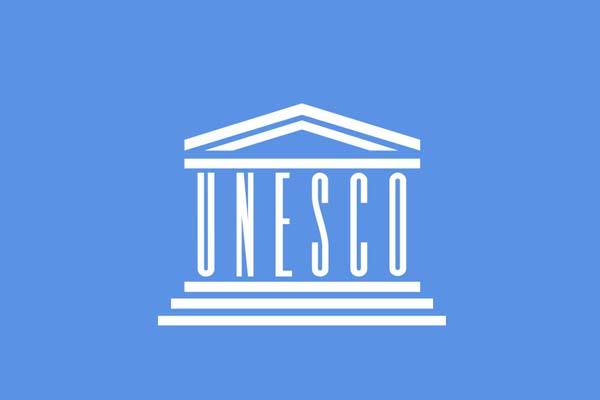
50 years of Collaboration between Auroville and UNESCO dated 23rd February 2017
The association between Auroville and UNESCO dates back even before the
project before the foundation of Auroville. Since 1966, UNESCO has passed five
resolutions in support of Auroville. In 1966, Mirra Alfassa, popularly known as the Mother, founder of
Auroville, appointed Mrs. Kailas Jhaveri to be the “Secretary-in-charge, UNESCO
section”. Since then collaboration has continued since 50 years of Auroville's
foundation.
The General Assembly of UNESCO unanimously passed in 1966, 1968, 1970 and 1983 resolutions
of support to Auroville, inviting
"member states and international non-governmental
organisations to participate in the development of Auroville as an
international cultural township designed to bring together the values of
different cultures and civilisations in a harmonious environment with
integrated living standards which correspond to man's physical and spiritual
needs."
The fifth resolution passed on 13th November 2017
at the 39th General Conference of the world body.
‘28 February 2018 will mark the 50th anniversary of the founding of
Auroville, Further recognizing that Auroville is a successful and unique model
project, proving the capacity of an international community, after almost 50
years of existence, to continue to live up to its initial founding ideas of
peace and international harmony and which are also UNESCO’s own values and
principles, as well as some of its major priorities
Invites the Director-General to reinforce the association of UNESCO with
Auroville and organize commemorative activities for its 50th anniversary and to
re-invite the Member States on the special occasion of Auroville’s 50th
anniversary, to participate in Auroville’s further development.’
UNESCO Resolution at 39th General Assembly 2017
UNESCO
has supported the foundation of Auroville and, over the years, has continued to
show interest in the unfolding development. The ideals of Auroville and
UNESCO's have similarities in values and principles. The key aspects of the
Auroville experiment resonate strongly with some of UNESCO's major priorities
and concerns such as dialogue among civilizations, cultures and religions;
cultural diversity and culture as a factor for development, poverty
eradication, quality education and life-long learning; and renewable energies.
Several
events, conferences have been organised over the years in collaboration with
Auroville and UNESCO. The Auroville Earth Institute is the UNESCO chair of
Earth Architecture established in Auroville.
Through the learning of Auroville’s five decades journey of
experiments for integral and unending education, compliments the larger goals of UNESCO
of and critical goal of the new UN 2030
Agenda for Sustainable Development and ensure inclusive and quality education
for all and promote lifelong learning.
"You
have been able to transcend what yesterday may have been barriers, that
separated you. You work together, you understand each other, and perhaps you
are what I might say a summing-up of the aspiration of the world of
tomorrow."
Mr. A.
M. M'Bow from Senegal, then Director-General of UNESCO in 1986
"The
Auroville project situated in Tamil Nadu, South India, which has been supported
by the General Conference of UNESCO in 1966, 1968, 1970 and 1983, is actively
developing according to the basic principles of international understanding and
human unity."
Snr.
Federico Mayor, Director-General of UNESCO 1998
Auroville's
ability to survive and evolve over four decades bears witness to the strength
of the founding principles and the resolve and perseverance of its citizens. In
today's globalized world fraught with regional conflicts and economic
instability, it is especially reassuring to witness such enduring models of
solidarity and humanism.
Mr. Koïchiro Matsuura, Director-General
of UNESCO on 40th Anniversary of Auroville 2008
Sri Aurobindo will also forever be associated with the founding of Auroville -a unique international township founded in 1968, as a place where people from different cultural, educational and political backgrounds can work together towards the common goal of unity through diversity.I have indeed visited this magical place.Today, his learning and vision continue to draw devotees from the world over following his profound Integral Yoga teachings.
Mrs.Irina Bokova, Director-General of UNESCO 2014
India's National Statement by H.E. Mr. Vishal V. SHARMA Ambassador, Permanent Delegate of India to UNESCO during the 214th Session of the Executive Board on 4 April 2022..
Resolution October 2017
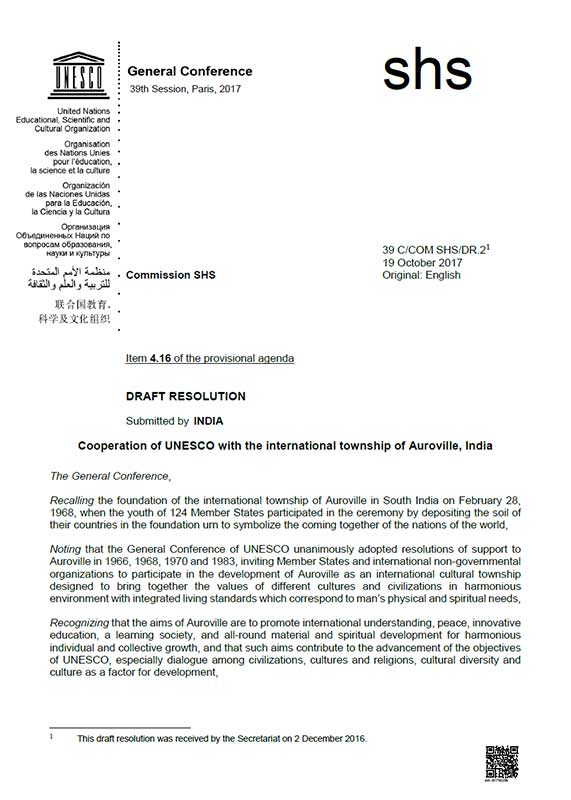
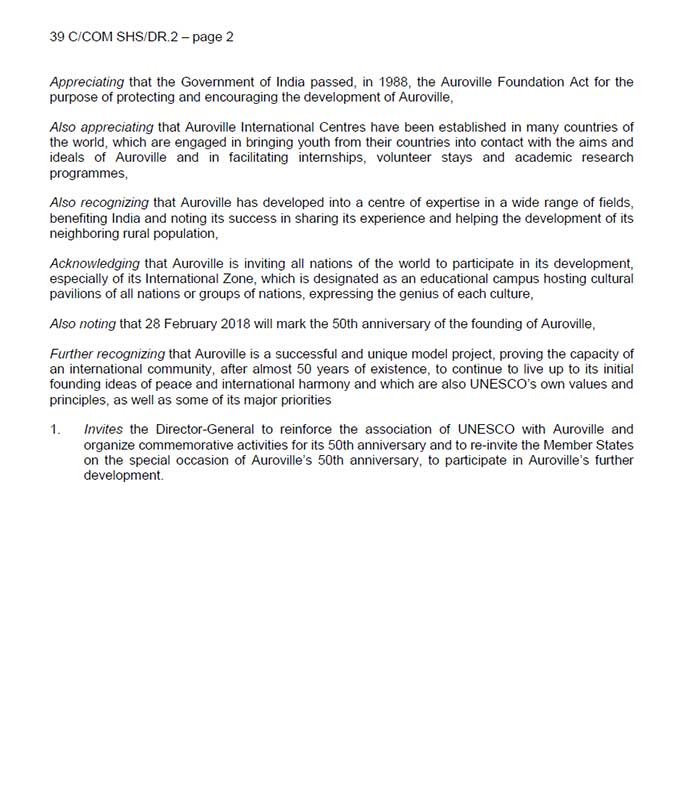
1966, 1968, 1970 and 1983 resolutions
The General Assembly of UNESCO unanimously passed in 1966, 1968, 1970 and 1983 resolutions of support to Auroville, inviting
"member states and international non-governmental organisations to participate in the development of Auroville as an international cultural township designed to bring together the values of different cultures and civilisations in a harmonious environment with integrated living standards which correspond to man's physical and spiritual needs."
Dr. M. S. Adiseshiah on 28th February 1969
Dr. M. S. Adiseshiah, then Deputy Director-General of UNESCO, in an interview with All India Radio Broadcast on 28th February 1969:
Q. How would you assess the importance of Auroville for India and the world?
A. "For India, I believe that we need, as a country, everything that can help us to live together as a people with many different cultural backgrounds, religious backgrounds and social backgrounds. Our programme for national integration is one expression of this, and I believe that in Auroville we will have yet another start, a start based on the fundamental unity of the human mind and of human consciousness for the flowering of the kind of unity which our country needs so desperately today. (...) I believe that Auroville is one of the pilots that can lead us on to that land of unity where we can all join together in working for the development of our country ...
As far as the world is concerned, I believe, in addition to development, the need for peace does not need any repeating on my part. I believe that peace which passes beyond economic and political arrangements on which the present uneasy truce is based, peace based on the consciousness of men as men, of certainties in our hearts and spirit, on which Auroville and its programme is founded, will assure the peace that we are looking for in the world."
Dr. M. S. Adiseshiah in March 1968
Dr. M. S. Adiseshiah, then Deputy Director-General of UNESCO, at the Auroville - UNESCO symposium in Pondicherry in March 1968:
"We have tried in UNESCO....we have tried every way, and we have failed. And so now we turn to Auroville.... And so, on behalf of UNESCO....I hail Auroville, its conception and realisation, as a hope for all of us and particularly for our children, for our youth who are disillusioned with the world that we have built for them and who will find in Auroville as they found at the time of its foundation ceremony, a living symbol, inspiring them to live the life to which they are called."
Mr. A. M. M'Bow during his visit in 1986
Mr. A. M. M'Bow from Senegal, then Director-General of UNESCO, during his visit in 1986, addressing the Auroville residents as a member of the (first) Auroville International Advisory Council created under the "Auroville (Emergency Provision) Act 1980":
"You have been able to transcend what yesterday may have been barriers, that separated you. You work together, you understand each other, and perhaps you are what I might say a summing-up of the aspiration of the world of tomorrow."
Mr. C.L. Sharma on 27th February 1993
Mr. C.L. Sharma, Deputy Director-General of UNESCO came from Paris on behalf of Snr. Federico Mayor, Director-General of UNESCO, for the first meeting of the (second) Auroville International Advisory Council on 27th February 1993. In an interview about UNESCO's connection with Auroville, he said:
"I am absolutely delighted to be here and it is much better than I expected it to be. UNESCO has been conscious for a long time of Auroville's mission, of what it is trying to do. There have been successive resolutions passed by the General Assembly in favour of Auroville, bringing it to the notice of our 170 member states. UNESCO has also associated itself with seminars and meetings and contributed $ 25,000 to the recent Birthday celebrations. This is a very clear expression of UNESCO's, not just interest, but support and appreciation of an experiment that we definitely want to succeed because today's world problems are due to lack of understanding between human beings. (...) We need to make a conscious effort in "peace building". Billions of dollars are spent on "peace keeping". This is only a short-term remedy, but "peace building" is the longer term and that is UNESCO's mission. The mission of Auroville has a lot in common with what UNESCO is trying to do."
Snr. Federico Mayor on 31st January 1998
Snr. Federico Mayor, Director-General of UNESCO, in his letter of 31.01.98:
"The Auroville project situated in Tamil Nadu, South India, which has been supported by the General Conference of UNESCO in 1966, 1968, 1970 and 1983, is actively developing according to the basic principles of international understanding and human unity."
April 11, 2003
Office of the General Delegation UNESCO PARIS Paris, April 11, 2003, 2:38 PM
Flash Info n° 134
Office of the Spokeswoman UNESCO
35th anniversary of the founding of Auroville
Yesterday, the Director-General of UNESCO, Koïchiro Matsuura, participated in celebrations at UNESCO Headquarters marking the 35th anniversary of the founding of Auroville, a unique ' model city ' near Pondicherry, India. Opening an exhibition on Auroville, Mr Matsuura said that " as an intellectual and ethical organization, UNESCO cannot fail to be fascinated by this experience ". Inspired by the great Indian spiritual master Sri Aurobindo, Auroville has developed into a full-fledged city of over 1500 inhabitants and enjoys close links with surrounding communities.
Noting that UNESCO had supported the foundation of Auroville and, over the years, has continued to show interest in the unfolding development, the Director-General stressed the similarities between UNESCO's ideals, values and principles and those underpinning this unusual community. He pointed to the way in which key aspects of the Auroville experiment resonate strongly with some of UNESCO's major priorities and concerns such as dialogue among civilizations, cultures and religions; cultural diversity and culture as a factor for development, poverty eradication, quality education and life-long learning; and renewable energies.
The Director-General expressed his appreciation of the cooperation with the Indian Permanent Delegation in organizing the Auroville celebration at Headquarters.
Statement of Mr. S.K.Tripathy,
then Secretary of State for Education, Govt. of India, at the function celebrating Auroville's 35th anniversary at UNESCO headquarters in Paris in March 2003:
"Auroville has already brought a transformation in the areas surrounding itby adopting people-friendly technologies, eco-friendly farms which do not
destroy the Mother Earth, income generating industrial units which do not
pollute the air, and many such innovations which point towards an India of
the future which is prosperous, in tune with nature, does not sacrifice its
collective goals, and which acts as an inspiration for the new generation.
Towards this aim, WE ARE HERE TO SUPPORT AUROVILLE AS PARTNERS
IN PROGRESS, AS FACILITATORS RATHER THAN AS MERE ADMINISTRATORS,
and would like to contribute towards the progress of Auroville to serve as
a beacon of hope, not only for the future of India, but also for humanity as a whole."
Resolution on Auroville: August 2007
Commemorative activities for the 40 th anniversary of the establishment of Auroville, an international township (177 EX/70 and Add: 177 EX/INF. 11; 177 EX/78; 177 EX/79 Part ll)
The Executive Board,
- Recalling the foundation of the international township of Auroville, in South India, in February 1968, when the youth of 124 Member States participated in the ceremony by depositing the soil of their countries in the foundation urn to symbolize the coming together of the nations of the world.
- Noting that the Charter of Auroville, announced at the Foundation Ceremony, declares that Auroville belongs to nobody in particular but to humanity as a whole,
- Recognizing that the aims of Auroville are to promote international understanding, peace, innovative education, a learning society, and all-round material and spiritual development for harmonious individual and collective growth, and that such aims contribute to the advancement of the objectives of UNESCO, especially dialogue among civilizations, cultures and religions, cultural diversity, and cultural diversity, and culture as a factor for development,
- Recalling that in 1983 the General Conference adopted a resolution inviting Member States and international non-governmental organizations to participate in the development of Auroville as an international cultural township,
- Conscious therefore of the broad range of activities undertaken by governments, National Commissions for UNESCO, and international non-governmental organizations to promote the development of Auroville as an important international cultural programme,
- Recognizing the value of such civilizing experiences as an invaluable and integral part of the commonly shared human experience,
- Also recognizing that Auroville is a successful and unique model project, proving the capacity of an international community, after 40 year of existence, to continue to live up to its initial founding ideals of peace and international harmony and within the spirit of mutual respect and sustainable development which are also UNESCO's own values and principles, as well as some of its major priorities,
- Noting that 28 February 2008 will mark the 40 th anniversary of the setting up of Auroville project,
- Invites the Director-General to reinforce the association of UNESCO, and in particular its Culture Sector, with Auroville in the context to the commemorative activities for its 40 th anniversary.
http://unesdoc.unesco.org/images/0015/001529/152904e.pdf
Auroville's 40th anniversary celebrated at UNESCO, October 2008
On 10 October, UNESCO Director-General Koïchiro Matsuura joined Dr Kapila Vatsayan, India's Representative to the Executive Board for the opening of a Round Table to celebrate the fortieth anniversary of the Auroville township in Tamil Nadu, India. Also present were Mr George Anastassopoulos, President of UNESCO's General Conference, Mr Olabiyi Babalola Joseph Yaï, Chairman of the Executive Board, Ms Bhaswati Mukherjee, Ambassador, Permanent Delegate of India to UNESCO and representatives of the Auroville Foundation.
Over the last four decades, UNESCO has enjoyed a special relationship with this unique international township in south India, said the Director-General. During its foundation ceremony in February 1968, young people representing 124 UNESCO Member States deposited soil from their respective countries on the site of the future township to illustrate the fundamental concept of unity in diversity. Since that historic day, UNESCO has regularly reiterated its support for Auroville, a place that embodies many of the principles underlying the Organization's worldwide action to promote cultural diversity, intercultural dialogue and lifelong learning as the basis for peaceful, sustainable societies.
Mr Matsuura recalled that forty years ago, the founders of Auroville set a most noble objective: to create a place where people from different cultural, educational and political backgrounds can meet and work together towards their common goal of sustainable living. Thus, Auroville stands out as an unparalleled human experiment in transforming these ideals into reality, the Director-General continued, adding that in so doing, Aurovillians have worked closely with the inhabitants of the surrounding villages to help improve their living conditions. The outlying rural region, considered by the local government as among India's most underdeveloped areas, has benefited greatly from Auroville's presence. Some 5,000 people from local communities have found employment in the township, and a number of health and educational facilities have been created to serve them, he said.
Mr Matsuura went on to state that Auroville's ability to survive and evolve over four decades bears witness to the strength of the founding principles and the resolve and perseverance of its citizens. In today's globalized world fraught with regional conflicts and economic instability, it is especially reassuring to witness such enduring models of solidarity and humanism. The Director-General concluded by expressing his hope that the lessons learned in Auroville will inspire similar experiments in sustainable living in other parts of the world. I look forward to continued collaboration between UNESCO and Aurovillians.
See full report
September 2009
UNESCO Director-General unveils the bronze statue of Sri Aurobindo, great philosopher, savant and spiritualist from India
On 16 September 2009, Mr Koïchiro Matsuura, Director-General of UNESCO joined Mr Rameshwar Pal Agrawal the Secretary for Education of the Government of India and Dr Karan Singh, Chairman of the Auroville Foundation, to unveil the bronze statue of Sri Aurobindo, recently installed at UNESCO's Headquarters premises.
Dr Kapila Vatsyayan, India 's representative to the Executive Board and Ambassador Bhaswati Mukherjee also participated in the ceremony.
Observing that the crises that the world is traversing are not only economic and financial, but moral, ethical, and spiritual, Mr Matsuura said that The teachings of Sri Aurobindo, who will forever be associated with the founding of Auroville, the unique international township founded as a place where people from different cultural, educational and political backgrounds could work together towards their common goal of human unity and sustainable living, resonate particularly strongly as we search for long-term solutions. It is therefore very fitting that this monumental sculpture by a member of the Auroville community, Mr Lalit Verma, should find a home in this House of Dialogue, he continued.
Praising the strong cooperation between India and the Organization, the Director-General addressed his guests and commented that Your collective presence, and the installation of this statue at UNESCO's Headquarters, are apt symbols of the strong cooperation between India and UNESCO in our work to build a more just and sustainable world.
January 12, 2010
The Director-General of UNESCOvisits Auroville
March, 2012
Greetings from The Director-General of UNESCO
Last year the coordinators for the Bulgarian Pavilion invocation events contacted the Director-General of UNESCO Mrs. Irina Bokova (being herself Bulgarian and having visited Auroville in Jan 2010) to send greetings for our beginning and for the inauguration of the new Unity Pavilion hall, and we received a letter of support and appreciaton from her.
See the document below.
-
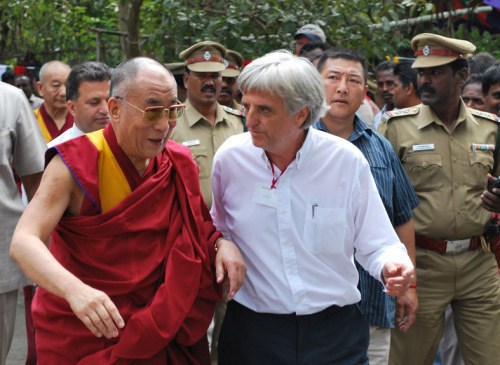
His Holiness The Dalai Lama
-
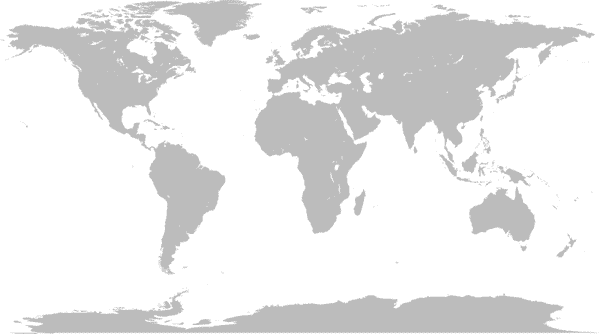
List of Funding Agencies
-
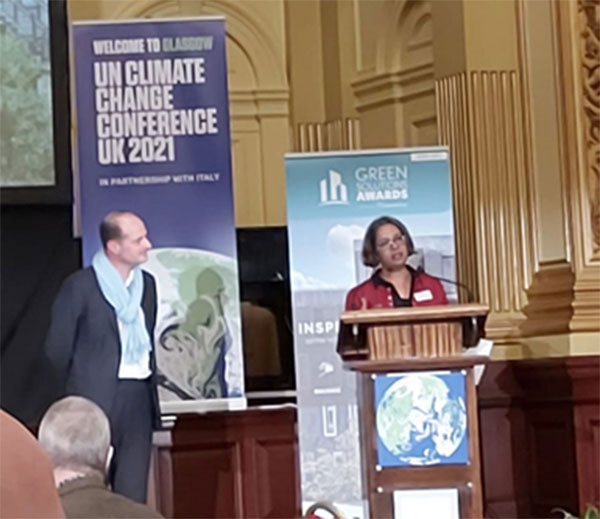
Awards
-
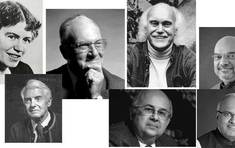
Statements of Support
-
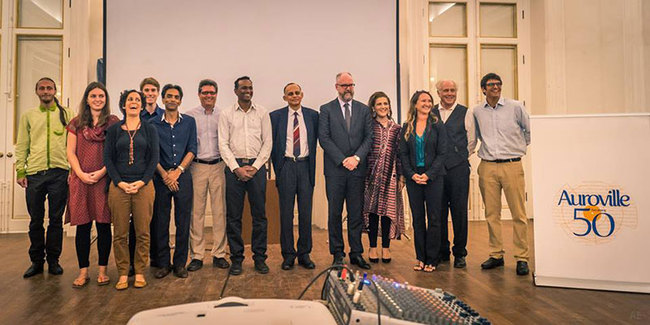
Meeting the German Consul in Chennai
-
.jpg?1592892599)
India's PM Modi visits Auroville on 25 February 2018
-
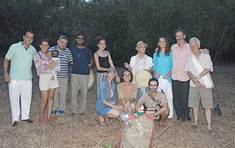
Ecuador Consul visits Auroville
-
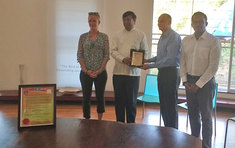
Sri Lanka's SUNFO award for Auroville
-
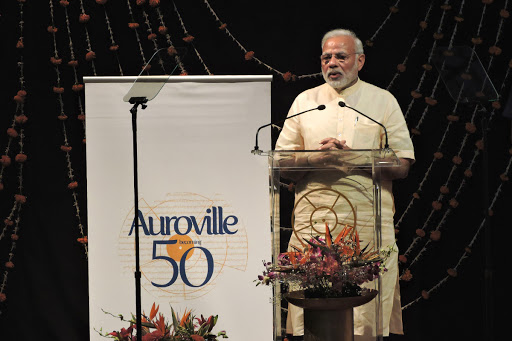
Statements of support from Government of India
-
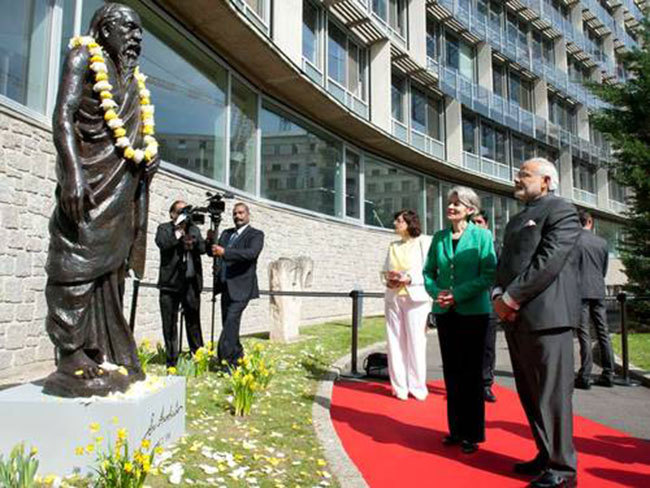
India PM Narendra Modi in Paris UNESCO pays homage to Sri Aurobindo
-

Earth Institute, Low Carbon Award - Marrakech
-
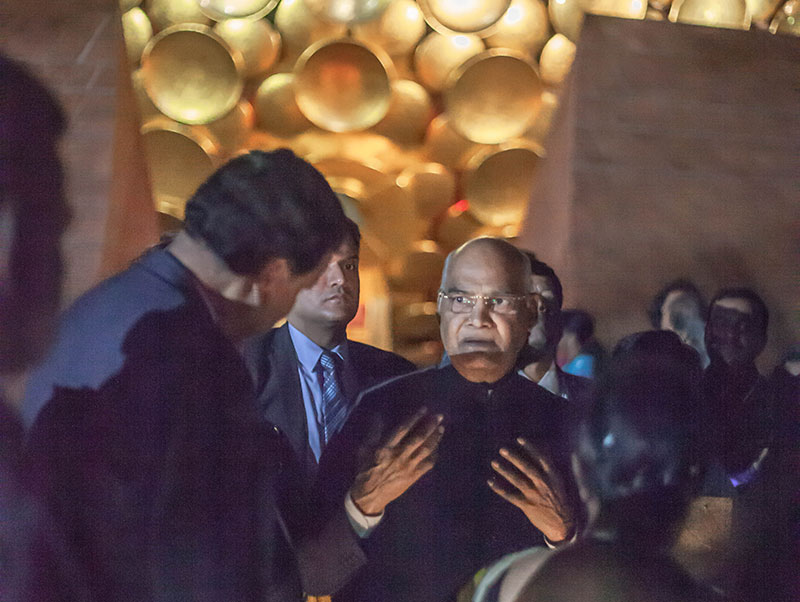
Visit of the honorable President of India to Auroville
-
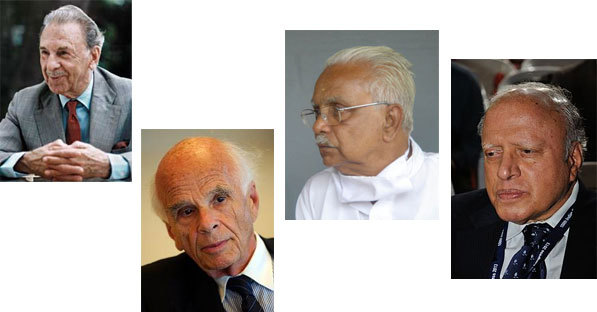
Statements of Support from International Advisory Council Members
-
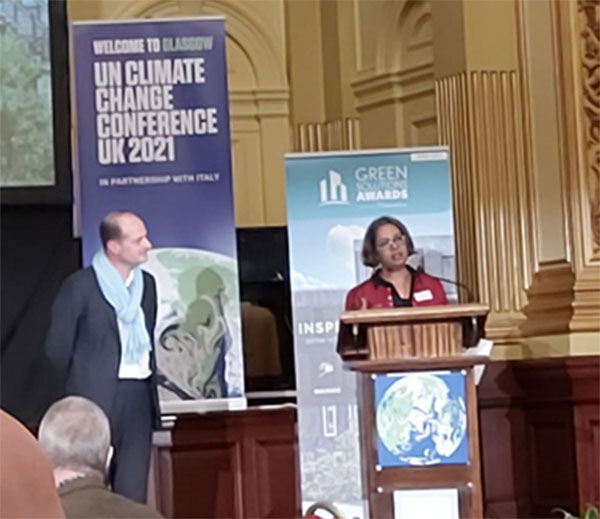
Suhasini gets award at Glasgow
-
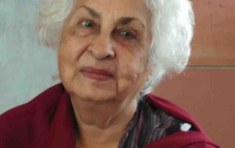
Aster Patel: "Inwardly, Auroville is blossoming"
-
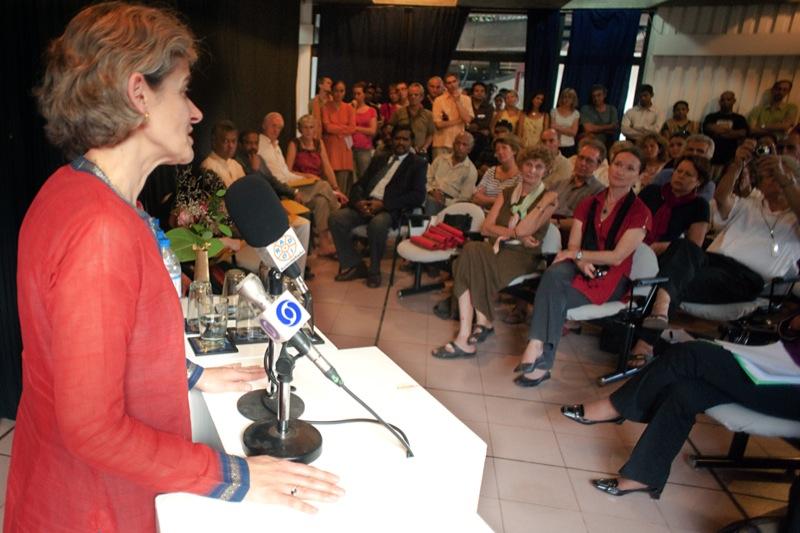
Director-General of UNESCO visits Auroville
